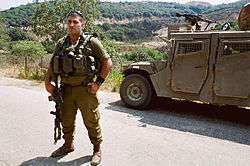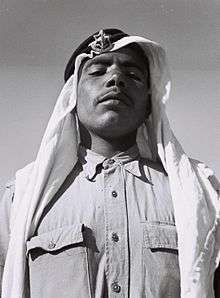IDF Sword Battalion
| Sword Battalion | |
|---|---|
| Active | Summer 1948 |
| Country |
|
| Allegiance |
|
| Branch | Army |
| Type | Infantry |
| Size | Battalion |
| Part of | 91st Division |
| Engagements | |

The IDF Sword Battalion (Hebrew: גדוד חרב, Gdud Herev), formerly known as Unit 300 and as the IDF Minorities Unit, is an Arabic-speaking unit of the Israel Defense Forces. Serving throughout the IDF, non-Jewish minorities commonly also serve in the Druze Reconnaissance Unit and the Bedouin Trackers Unit as well as all other units in the IDF.
History



The Minorities Unit was formed in the early summer of 1948 by incorporating a unit of Druze defectors from the Arab Liberation Army and small numbers of Bedouin and Circassians.[1] The unit was attached to the Oded Brigade and fought in Operation Hiram in October 1948. It has fought in every war since. Today, most members of the unit are Druze, but there are also Bedouins, Circassians and Christian and Muslim Arabs. The unit has produced several generals.
The Minorities Unit has a small elite Sayeret special forces branch.
Druze and Circassian men are subject to mandatory conscription to the IDF.[2] In the mid-1950s, the Druze leadership appealed to David Ben-Gurion, then Minister of Defense, to draft Druze men on the same basis as Jews. The State Defense Act of 1949, which called for drafting all individuals in the country, allowed the minister to issue exemptions for certain groups. The Druze asked that their exemption be canceled.[3] Originally, they served in the framework of a special unit. Since the 1980s, Druze soldiers have joined regular combat units, attaining high ranks and commendations for distinguished service. 83 percent of Druze boys serve in the army according to IDF statistics.[4] According to the Israeli army, 369 Druze soldiers have been killed in combat operations since 1948.[5]
_-_A_druze_idf_soldier.jpg)
There is a long-standing government policy of encouraging Bedouins to volunteer and offering them various inducements. In some Bedouin communities a military career is seen as a means of social mobility. Muslim and Christian Arabs are also accepted as volunteers.[6][7]
In 1987, Unit 300 was officially renamed "Sword Battalion." (Gdud Herev)[8]
In May 2015 the IDF published plans to disband Sword Battalion, after research revealed the vast majority of recruits would rather integrate into the rest of the army.[9]
See also
References
- ↑ Druze and Jews
- ↑ "IDF human resources site" (in Hebrew). IDF. Retrieved 2010-06-10.
- ↑ "The Druze Minority in Israel in the Mid-1990s by Gabriel Ben-Dor". jcpa.org. Retrieved 28 February 2015.
- ↑ Larry Derfner (January 15, 2009). "Covenant of blood". The Jerusalem Post. Retrieved 2010-06-10.
- ↑ "Ready for the First Druze Pilot?" (in Hebrew). IDF Spokesperson's Unit. October 11, 2010. Retrieved 2012-04-02.
- ↑ "IDF Human Resources site" (in Hebrew). Retrieved 2010-06-10.
- ↑ Michal Yaakov Yitzhaki (7 September 2013). "An officer and a Muslim Zionist". Israel HaYom. Retrieved 20 June 2013.
- ↑ Surrounded: Palestinian soldiers in the Israeli military. By Rhoda Ann Kanaaneh. p. 53
- ↑ Cohen, Gili (May 19, 2015). "IDF to disband Druze battalion after more than 40 years' service". Haaretz. Retrieved 2015-05-19.
Further reading
- Parsons, Laila (2001). The Druze and the birth of Israel. In Eugene L. Rogan and Avi Shalim (Eds.). The War for Palestine (pp. 60–78). Cambridge: Cambridge University Press. ISBN 0-521-79476-5
- Zeedan, Rami (2015). Battalion of Arab- The History of the Minorities' Unit in the IDF from 1948 to 1956. Ben Shemen, Israel: Modan Publishing, in cooperation with Maarachot. (Hebrew).